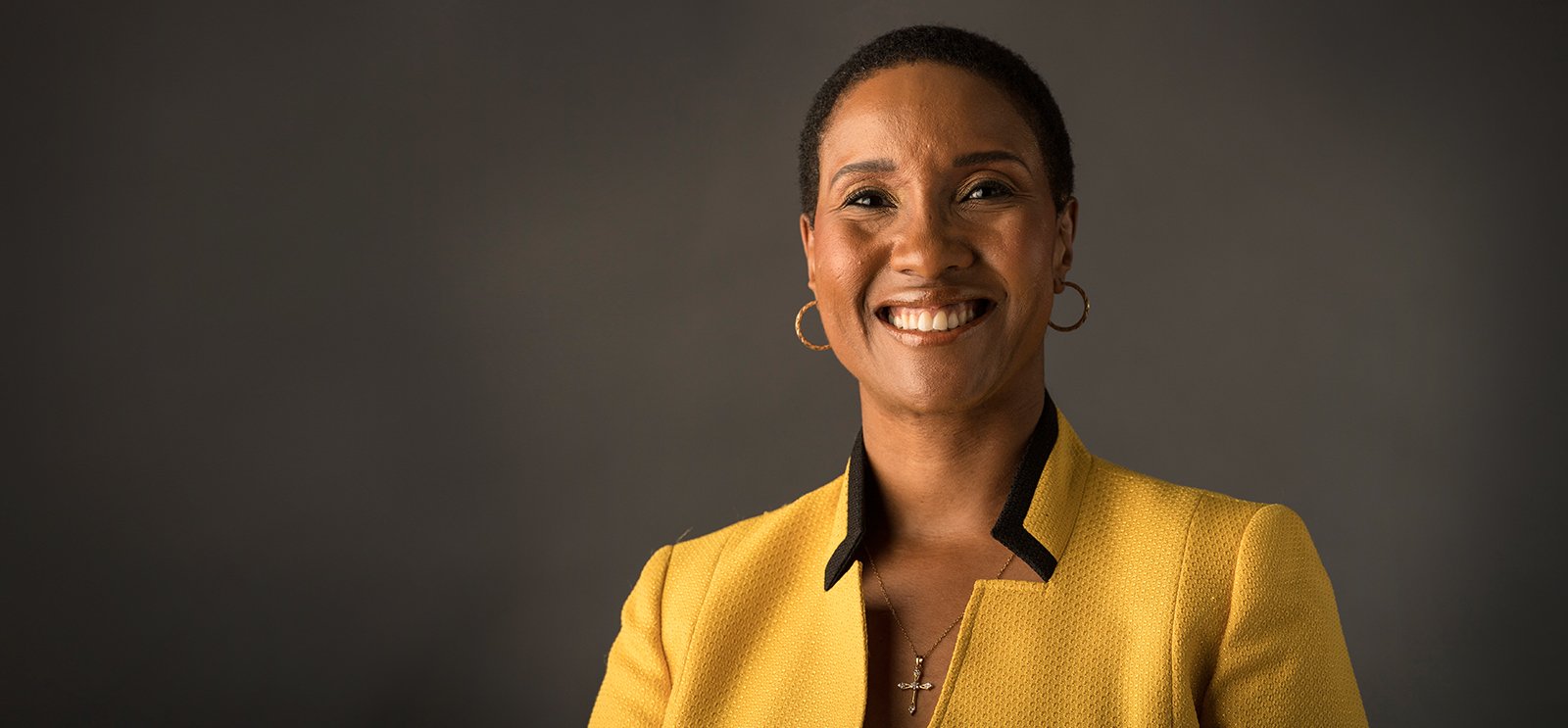
McCoy started working at her dad’s law firm at 14. Now she’s a partner. (Photography by Michigan Media)
Attorney Robyn McCoy, AB’96, teaches what to do during a police stop.
The Trayvon Martin case was the catalyst. “I was so anguished about it,” says Robyn McCoy, AB’96. “I’m always lecturing my clients, telling them, look ... if you just follow the right path, then everything’s going to be OK. He wasn’t doing anything wrong, and he still was killed.”
First McCoy felt sad, then angry. Finally she decided, “I can’t just have a pity party about this,” she says. “What am I going to do?”
McCoy has worked as a criminal defense attorney in Michigan for 15 years. Since 2014 she has collaborated with Judge Deborah Thomas of the Third Circuit Court on public presentations about expungement. Thomas explains, from a judge’s perspective, how to clear a criminal record; McCoy goes over the actual application. It’s valuable work—and McCoy still does it—but even better, she says, would be teaching people “how to avoid catching a case” in the first place.
Like many defense attorneys, McCoy was weary of trying to help clients who had consented to a search or given a confession. “Don’t give a statement,” she says. “A lot of times I have clients who ... get tricked into making a statement. They get manipulated, and then that helps to seal their fate.” There is only so much she can do, she says, when her clients have given away their rights.
In February 2015, she organized her first workshop, “What to Do When Stopped by the Police,” at New Hope Baptist Church in Ann Arbor. Speakers included the Washtenaw County sheriff, the Ann Arbor police chief, the Washtenaw County prosecutor, a public defender, a criminal defense attorney, and an American Civil Liberties Union attorney. “I felt like all of the players in the process needed to be there,” McCoy says. Despite frigid temperatures, 100 people showed up.
Over the past year, McCoy has organized similar presentations at high schools and elsewhere: five in Detroit, three in Washtenaw County (which includes Ann Arbor and Ypsilanti). Some of the workshops, like the one at Detroit’s Henry Ford High School, are archived on YouTube.
Almost every speaker at Henry Ford gives a version of the same basic advice: Be polite. Be respectful. Think before you act. Many of them do so by telling about their own experiences with police while off duty or when they were teens. One police detective uses a slideshow, and a generous serving of edgy humor, to explain to students what to do if they’re stopped while driving—and what not to do. “Don’t bribe us with money or doughnuts,” he says, drawing laughs.
Also covered: knowing what your rights are, and your resources if those rights are violated. “Who polices the police?” the US attorney for Michigan’s Eastern District asked the Henry Ford students. “I do. … When you believe that a police officer has violated your civil rights, I want to know about it.” She goes on to explain the criminal and civil statutes her office enforces. The next speaker, Judge Thomas, gives the students pocket-sized cards outlining their rights as citizens.
McCoy’s cast of presenters continues to evolve, based on what audiences tell her. “Look, Ms. McCoy, it’s good that you’re educating us,” she’s heard students say. “It’s good that you’re letting us know what to do, but what are the police doing?” So she began including more information on police accountability.
McCoy is a partner with McCoy & Associates, founded by her father, Robert McCoy; she first worked there at 14, filing documents and answering phones. (Her father, who grew up in a family of 16 in Benton Harbor, Michigan, was inspired to become a lawyer by watching Perry Mason.) Robyn McCoy considered becoming a nurse like her mother “for five minutes,” she says. Then “I went to the hospital with her and walked past the morgue.”
At UChicago she majored in anthropology and cofounded Sistafriends, a networking group for African American women that was active for about 10 years. One of her mentors was the founding director of the University Community Service Center, Michelle Obama. Obama offered advice on law school and encouraged McCoy to take her husband’s class. But McCoy’s father wanted her to graduate early, so she just sat in rather than formally enrolling. She still ribs him: “Dad, you told me not to take the class with the first black president!”
After earning her law degree at the University of Michigan, McCoy worked at the Legal Aid and Defender Association and several firms, including her father’s. Since 2007 she has served as an attorney for the Michigan Children’s Law Center in Detroit, advocating for children in neglect and abuse cases and in delinquency cases.
With school out, McCoy spent the summer planning where she will give her presentations next academic year. Some people have advised her to start a nonprofit, others to write a book.
In the black community, McCoy says, “generally, I know that most people would say they’re scared of the police.” She had that fear herself growing up. But when she brings police officers into schools, sometimes students want to know, “What does it take to become a police officer?”
So McCoy put together a resource list and asked police recruiters to attend the programs. In the short term, her program helps young people stay safe. In the longer term, it might bring about a more significant change. If there’s more diversity on the force, McCoy says, “that can definitely change the culture.”
